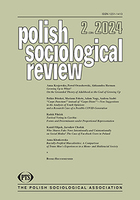Who Shares Fake News Intentionally and Unintentionally on Social Media?
The Case of Facebook Users in Poland
Who Shares Fake News Intentionally and Unintentionally on Social Media?
The Case of Facebook Users in Poland
Author(s): Kamil Filipek, Jarosław ChodakSubject(s): Media studies, Crowd Psychology: Mass phenomena and political interactions
Published by: Polskie Towarzystwo Socjologiczne
Keywords: fake news; Facebook; news sharing; media literacy; media consumption;
Summary/Abstract: By exploring users’ engagement in communication and their social media literacy (SML), this study examines who shares fake news on Facebook intentionally and unintentionally. A two-phase online survey has been conducted among 1,000 active Facebook users in Poland. We found that users engaged in communication on multiple social media platforms tend to share fake news intentionally. There is a negative relationship between SML score and intentional sharing. However, those with higher functional consumption scores (the dimension of SML) tend to share fake news intentionally. Men are less likely to share fake news unintentionally. The cross- tabulation of classes and variables related to social media use revealed that users with lower level of salary, education and occupational status are most likely to share fake news both intentionally and unintentionally.
Journal: Polish Sociological Review
- Issue Year: 226/2024
- Issue No: 2
- Page Range: 169-188
- Page Count: 20
- Language: English

